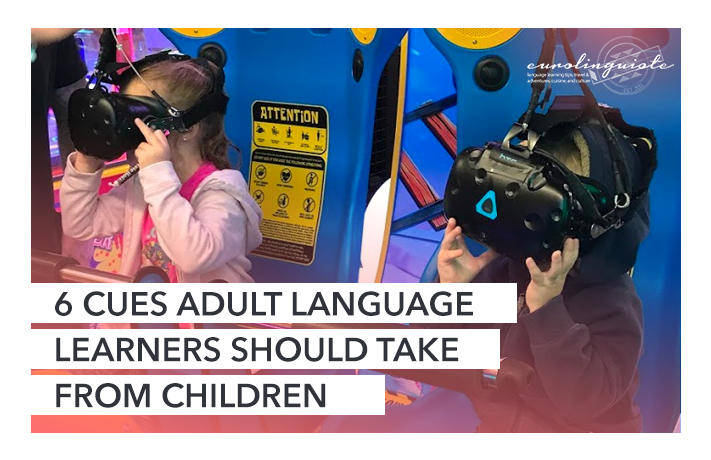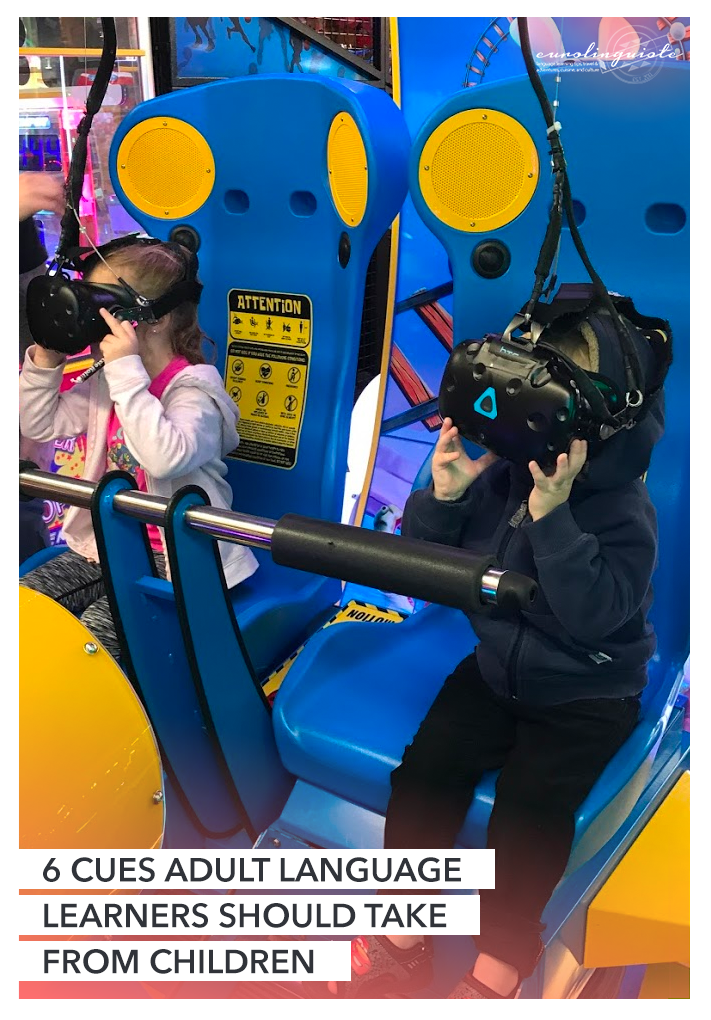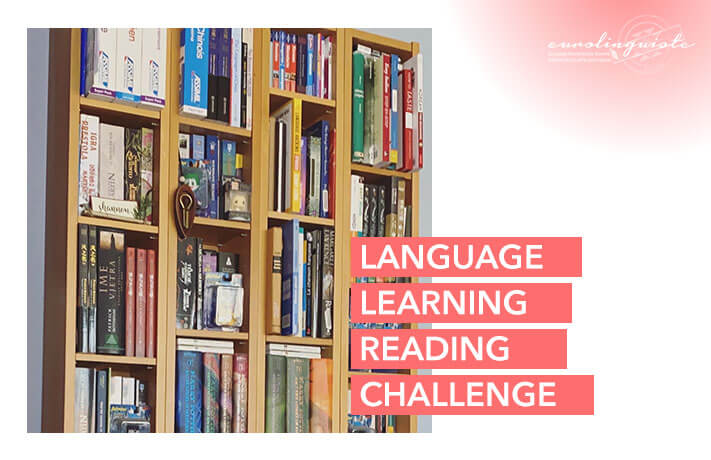6 Cues Adult Language Learners Should Take From Children

My name is Shannon Kennedy and I'm the language lover,…
It’s often said that kids are better language learners than adults. While this has been proven not to be the case, there are still many things we can learn from kids and apply to our own language learning to be more effective in our studies.
The following article is a guest post that’s been updated to celebrate the release of our latest Language Conqueror Quest.
The Quest is all about the Power of Play. How we can learn like and with kids to improve our strategies as language learners.
Learn more about the latest Quest and level up your language learning.

6 Cues Adult Language Learners Should Take From Children
It’s no secret: children are language-learning geniuses. They come into this world as blank slates, and after a few years, they’re able to master any language — or even multiple languages — almost without fail. Indeed, it’s enviable the way that children simply absorb words and grammatical rules, as if their brains are linguistic sponges. As adults, we can certainly steal a few tips and tricks from them.
1. Stop using the F word
No, not that F word. I’m talking about “fluency”, the bane of any language learner. When children start learning words, they don’t think about their end goal — they don’t say, “I want to be fluent!” Instead, they simply let themselves learn at their own pace, implicitly knowing that one day, they’ll reach their desired level of linguistic competence.
If you constantly measure your progress in a foreign language based on whether or not you’re fluent, you’re sure to set yourself up for failure. Instead, let yourself learn at your own pace, enjoying the journey rather than obsessing over the destination. Set short-term, accomplishable goals, like being able to read a comic or understand a YouTube clip without subtitles. Trust in the fact that, with some time and effort, fluency will sneak up on you.
2. …and the other F word
Still not the one you’re thinking of! This time, I’m talking about fear. Children are utterly fearless in their linguistic abilities — never in the history of the world has a three-year-old refrained from throwing a tantrum because he was embarrassed by his imperfect understanding of grammar. While having emotional meltdowns in public is not a recommended language-learning strategy, trying to emulate children’s fearlessness is.
Yes, it is daunting to talk to native speakers, especially when you’re a beginner. But if you really want to improve your language skills, you’ll have to let go of that fear. Almost always, native speakers are simply impressed that you are making such an effort to communicate in their tongue.
If in-person conversation is still too scary a prospect, consider participating in forums online — Yahoo Answers or Quora are good forums for jumping in on foreign-language discussions. Or consider finding a foreign-language pen pal to chat with until you’re ready to face the natives in real life.
3. Create background noise
Children are constantly exposed to language; it’s one of the reasons why they learn so fast. They talk to their peers and parents; they overhear chit-chat both at home and in public; they hear songs on the radio and dialogues on TV.
There are several ways you can do this, too, even if you live somewhere that your target language isn’t spoken. Change your Facebook, mobile phone, and email into the target language. Load up your iPod with foreign-language songs. Listen to a foreign-language podcast on your way to work. This way, your target language will always be in the back of your mind, even when you’re not actively studying it.
4. Re-learn how to read
One of the best ways to emulate how children learn language is to bring out your inner child! Reading children’s books is a great way to learn a foreign language for several reasons. First, they use simple language that is ideal for beginners. Second, they typically contain ample illustrations that will help you figure out the plot if you’re getting lost. And finally, they are enjoyable to read — what better way to remember the good ol’ days than to revisit some of your childhood favorites?
5. Do things you enjoy in your target language
You learn language best when you’re having fun. For kids, every playdate or trip to the park is a chance to learn new words and practice speaking. So drop the grammar book and start combining your language practice and your hobbies.
If you like to cook, try to find a cooking class in your target language — and if there isn’t one, find a target-language recipe book and do it yourself at home. If you’re a movie buff, rent some movies in your target language and watch them, making note of the words and phrases you learn along the way.
6. Make yourself need to use your target language
This one may raise some eyebrows: how can you force yourself to need something? Well, think of it from a child’s perspective. If a child is hungry, she has to communicate this to her caretakers — she has no choice but to use language (however incomplete her skills may be) to fulfill her needs.
As an adult, hopefully you can feed yourself. But adult life comes with other challenges that can be great language learning opportunities. If your door is creaky, Google how to fix it in your target language. If there’s a news story you’re particularly interested in, read about it in a foreign-language newspaper. When you absolutely need to understand a foreign language in order to fix a squeaking door or be a well-informed global citizen, you’ll find yourself learning faster than ever before.
We can learn a lot from children, and this is especially true when it comes to learning a foreign language. While we may not ever be able to pick up a foreign language quite as efficiently as a child, we can take cues from them to maximize our language-learning potential.
What other language-learning strategies do you like to use? What other ways can we be more like children when we learn a language? Leave a comment!
And if you’re interested in learning more about this topic or joining a supportive group of language learners, then I invite you to join me in Language Conqueror!
As a part of Language Conqueror, you get:
- A video lesson introducing the Quest
- Daily prompts to guide you along the Quest each day
- A workbook with all the exercises and instructions you need to complete the Quest
- A video demonstrating the Quest in action from one of our hosts (or special guests)
- Trade secrets: these are tricks you can use to succeed at your Quest
- A Side-Quest: an action you can take to help you gain the confidence you need to complete your Quest
- Access to the Quest community so you can collaborate with other learners, share what you’re working on, and get support
- Your Quest: the final assignment you complete to put everything you learned over the month into practice
We hope to see you in the next Quest!

Paul writes for Language Trainers, which provides tailor-made individual and group language classes worldwide. Language Trainers offers Spanish classes in Los Angeles, as well as other foreign-language courses all over the globe. On their website, you’ll also find free language level tests and similar language-learning resources. For more information, visit their Facebook page or email [email protected].
My name is Shannon Kennedy and I'm the language lover, traveler, and foodie behind Eurolinguiste. I'm also the Head Coach of the Fluent in 3 Months Bootcamp, co-founder of Women in Language, and former Resident Polyglot at Drops.







